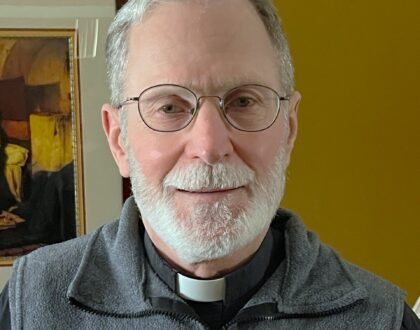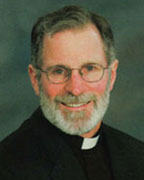Homily, October 15, 2023

From The Pastor
It is rare for people to spend much time thinking about the transition from this life to the next. We all know death is a reality, but not one we often considered. Death is largely framed as something in the future not worth consideration in the present. If life in the present is reasonably stable, comfortable, with no immediate threat of serious illness, the reality of death is rarely considered.
The bridge from here to the hereafter is not a long one. The on ramp however offers a very long approach. In the Christian life, the journey from here to heaven begins at Baptism that gains maturity with the deepening of faith. Our heaven begins here as we more deeply realize the truth of God within ourselves in vibrant and active ways. This is not an idle process. Like any maturing relationship, growing in faith and securing trust in the promise of eternal life takes time and attention. There will inevitably be ups and downs. A person will experience graces that awaken the discovery of deeply felt encounters with the living God. At other times, there will be disappointments, doubts, losses, and failures along the way. God is present in each of these life events for the one willing to trust and invite God in.
The readings today lead us to this kind of reflection. Through the Prophet Isaiah, we are well aware of the long history of oppression and exile endured by the people of Israel. Today’s reading is one of hope for all who suffer the weight of oppression and the perception of God’s absence or abandonment. ‘On this mountain, the Lord of hosts will provide for all peoples.’ In this setting, ‘mountain’ is easily understood as the dwelling of God’s presence, or in our more common language, heaven. It serves as an image of God’s abundant and provident care for all who seek him. It conveys an image of sweetness and comfort intended to soften the fear of death in the transition of life.
Isaiah is offering an image of hope and security for those who live in the fear of death. It makes clear that God will destroy death forever and that all tears and sadness will be wiped away. God will remove the fear of death caused by human sin and the disorder of evil. In the constancy and fidelity of God there will be great rejoicing and trust in all God promises. “Behold our God, to whom we looked to save us… let us rejoice and be glad that God has saved us!”
The gospel takes on a different tone to convey the same message. The chief priests and elders are trying to silence Jesus, yet with love and concern for their salvation, Jesus confronts them with an image of the Kingdom. Heaven is like a great wedding feast prepared by a King for his son’s wedding. God is the King and the Son is Jesus who represents all humanity. God is inviting humanity to a heavenly banquet that will unite all present in the union of Divine Love.
Invitations are sent out by personal messengers: all the Prophets and finally by Jesus himself. Invitations can be either accepted or rejected. This is the tension and the reason why the story is directed at the leaders of religion. Jesus makes clear the rejection of the invitation and the violent reaction it receives. But God will not be put off. Ultimately, all will be invited. The good and the bad, the wicked and the unworthy. God will not allow his offer to go unfulfilled.
Jesus is trying to break into the stubborn resistance and distain of those in religious power who will not surrender to the truth of God. Jesus offers them the Good News of the gospel as they insist on clinging to worldly power.
This invitation remains in effect today. We are included in the invitation to sit at the banquet of the Lord. Any invitation includes a choice and a decision. Every invitation involves some kind of surrender. I cannot accept the invitation of another strictly on my own terms. One surrenders to the offer of the host in the design of their intention. A guest must set aside their plans to accept the offer of the host. This is the case of the one without a wedding garment. He accepted the invitation, but on his terms. The wedding garment was a symbol of surrender to honor the offer of the King. It reveals an act of repentance in acceptance of the King’s offer to heavenly life. No wedding garment meant the person was there on their own terms in ill respect of the King’s offer.
The gospel is the Good News of God’s merciful and redemptive love. To walk the journey of the Christian life is a surrender to the identity of Jesus who shows us the way. It is a journey that creates a joyful purpose to the meaning of our existence. It secures us in both the grace and the failures the journey will bring. To accept the invitation is a movement of ongoing surrender to all the Lord promises.
Do not fear death. Realize and accept the King’s invitation. Be willing to surrender your plans for comfort and control in this world for the eternal comfort of heavenly glory. With a living faith that glory begins today.
Father John Esper
Recent Sermons

Homily, March 30, 2025
March 27, 2025

Homily, March 23, 2025
March 20, 2025

Homily, March 16, 2025
March 11, 2025

